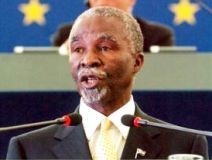S. Africa’s Mbeki to push Sudan on UN peace force
June 13, 2006 (PRETORIA) — South African President Thabo Mbeki will visit Sudan on June 20, hoping to press Khartoum to approve a U.N. takeover of an African Union peacekeeping operation there, a senior government official said on Tuesday.
 Mbeki’s one-day visit would include talks with Sudanese President Omar Hassan al-Bashir and First Vice-President Salva Kiir, who is also president of South Sudan, Deputy Foreign Minister Aziz Pahad said.
Mbeki’s one-day visit would include talks with Sudanese President Omar Hassan al-Bashir and First Vice-President Salva Kiir, who is also president of South Sudan, Deputy Foreign Minister Aziz Pahad said.
“This will be a good opportunity for the president…to discuss progress made,” Pahad told reporters.
He said Mbeki’s visit would seek ways to strengthen implementation of Sudan’s Comprehensive Peace Agreement, the deal struck 18 months ago that ended a 20-year civil war in the southern part of the country.
However, he said Mbeki would also press Khartoum to agree to an African Union proposal to allow the United Nations to take over from a 7,000-member AU force that is struggling to monitor a widely-ignored truce in Sudan’s western Darfur region.
“You cannot manage without it (a U.N. presence),” Pahad said. “The situation is grave.”
Pahad said South Africa hoped most of the peacekeepers would still come from African countries, which could allay what analysts say are Sudanese fears that a U.N. force would seek to arrest officials and government-allied militia leaders likely to be indicted by the International Criminal Court investigating alleged war crimes.
He said Pretoria, which itself has 437 troops in the AU force in Darfur, believed that only the U.N. would have the resources needed to mount an effective peacekeeping operation.
A senior U.N. official, in Sudan on a week-long mission seeking to plan for a possible transition, said on Monday that U.N. troops would not be able to deploy in Darfur before January 2007, making it likely that the AU force would remain in the country beyond its September 30 mandate.
Tens of thousands of people have been killed and more than two million forced from their homes in fighting since non-Arab rebels took up arms in early 2003 accusing the Arab-dominated government of monopolising wealth and power and marginalising Darfur.
Washington has described the violence as genocide, which is denied by Khartoum.
(Reuters)
